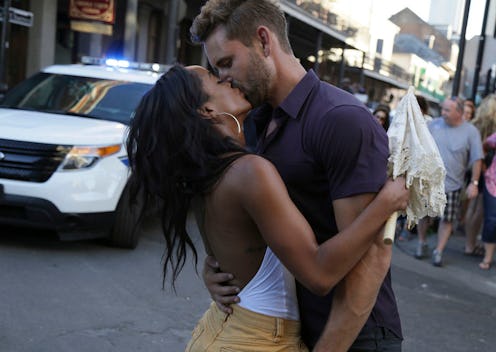Entertainment
Rachel Lindsay Defies A Harmful Media Stereotype

There has been a lot of talk so far about the fact that Rachel Lindsay will be the first black Bachelorette in the history of the show, which has been on for 14 years. In fact, she will be the first black lead in Bachelor Nation history; even the parent show, which has been on since 2002, has yet to feature a black lead. While both shows have received criticism for the lack of diversity, it's never been surprising, especially not to me. After all, they're both dating competition reality shows, and pop culture has rarely been kind to black women as love interests. We're either desexualized or hypersexualized with no real middle ground, the dateless best friend there to support her white friend's love life while experiencing no on-screen love of our own or the exotic sex symbol, the [virgin] or the whore.
I can list many such characters off the top of my head. Lily from The Devil Wears Prada. Lynette from The Nanny Diaries. Grace Rossiter from Legally Blonde 2: Red, White & Blonde. Amanda Waller from Suicide Squad. Leticia Musgrove from Monster's Ball. And, of course, a particularly strange case in Abbie Mills of Sleepy Hollow, who began to take a backseat in development and focus on her own show in favor of storylines and romances of her white co-lead.
The paradoxical fetishization or disinterest in black women on or off-screen has a historical basis in racism, as discussed by University of California, Santa Barbara Feminist Studies Professor Mireille Miller-Young in a 2007 interview with NPR:
I think that, you know, it speaks to the ways in which there's this simultaneous problem that was like a deep desire to have those bodies present and to consume those bodies as commodities, but a deep disgust for black people, our humanity and our bodies, at the same time that allows that devaluing to function.
Young was speaking of the racial wage gap between white strippers and black strippers, but her words are applicable to the treatment of black women in pop culture as well. It's still a surprise for black women to be treated as three-dimensional, valid, and desirable (without being sexualized) in movies that aren't specifically catered toward a black audience.
Take, for example, when the trailer for Spiderman: Homecoming hit the internet, and Peter Parker was revealed to have not one, but two, black love interests: Laura Harrier as Liz Allen and Zendaya, potentially, as Mary Jane Watson. (Although, to be fair, her character is allegedly called Michelle and, according to Zendaya, is "not romantic." Sure, Zendaya.) The essays and think pieces — not to mention the controversy — that resulted from the concept of the film having two black female leads, and one explicitly as a love interest, made it clear how uncommon such a thing is even in modern pop culture.
It's into that atmosphere that Rachel Lindsay is stepping as the first black lead of The Bachelorette. She will have an entire season devoted to finding love, an entire season devoted to over 20 men of various races angling for her heart, an entire season devoted to painting her as an earnest, open woman who is ready to settle down with one very special guy if he can prove to her that he is the one for her above the 19+ other guys that she's dating. And she'll do this all without being sexualized, I presume, since she was never portrayed that way on Nick's season and is thus unlikely to be portrayed that way on her own season.
More importantly, even if she is sexualized, it will be her choice because it's her season. She will be allowed control of her own sexuality, and where and with whom she chooses to express it, rather than being a sexual object. That in and of itself is huge.
Hopefully, seeing Rachel in this role on The Bachelorette becomes the wake-up call that the rest of Hollywood needs to understand that black women can be viable love interests, can be leading love interests, without having to fall into one stereotype or another and without ever having to be a footnote in a white person's story.